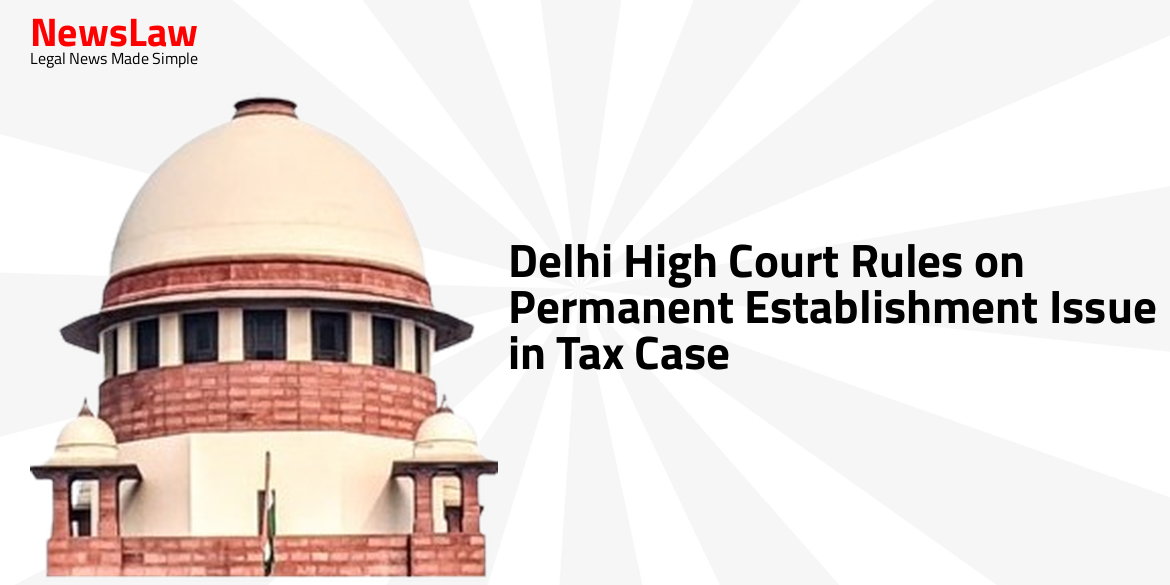In a landmark decision by the Delhi High Court, the issue of Permanent Establishment in a tax case involving international transactions was thoroughly examined. This ruling carries significant implications for businesses engaging in cross-border activities, particularly in terms of taxation and compliance. Stay informed about how this judgment could shape future legal interpretations in similar cases.
Facts
- The petitioner is a foreign company registered under the laws of Delaware, USA, and is part of the Caterpillar Group.
- The main international transaction involves providing technical support services.
- The Indian subsidiary of the petitioner, Progress Rail Innovations Pvt. Ltd., was incorporated in 1996 and had a manufacturing unit in Noida.
- In Financial Year 2021-22, the Noida plant was shut down, and the manufacturing facility was shifted to Hubli, Karnataka.
- The Indian subsidiary is assessed in New Delhi and has been subjected to transfer pricing studies.
- The core business activities of the petitioner and the Indian subsidiary are distinctly different.
- The international transactions entered into by the petitioner are in tabulated form.
- During FY 2012-13, EMD India was primarily involved in providing support services to Group Companies.
Issue
- The fundamental question to answer is whether a PE (Permanent Establishment) came into existence within the territorial area empowered by the Act
- The examination should determine if the Section 148 power was justifiably invoked
- This analysis is crucial in understanding the delivery of goods’ risk or responsibility between EMD Locomotive Technology Pvt. Ltd. Noida and Electromotive Diesel Inc. USA
Arguments
- Learned senior counsel argued that the Noida premises of the petitioner could not be considered a virtual projection of the holding company.
- Interrelated transactions were conducted at arm’s length and assessed in transfer pricing studies.
- The services performed by the Indian subsidiary were argued to be identical to those in a Supreme Court case, thus challenging the assumption of jurisdiction under Sections 147/148 of the Act.
- The impugned notices were questioned on the grounds of lack of prima facie view or recorded reasons for the charge of income escaping assessment.
- Reference was made to the Formula One World Championship case and the judgments in Samsung Heavy Industries and E-Funds IT Solutions Inc. to support the argument against jurisdiction.
- The argument was made that the Noida factory did not constitute a Fixed Place PE of the petitioner, and emails were cited to support this contention.
- The petitioner was claimed to be providing services through its employees for the benefit of its Indian subsidiary, making it a Service PE under the India-USA DTAA.
- The first respondent was criticized for not basing the action on any material establishing the principal function of the Indian subsidiary in relation to contracts with Indian Railways.
- The Transfer Pricing Officer’s examination did not recognize the Indian subsidiary as a PE of the petitioner, contrary to the assumptions made by the first respondent.
- The jurisdictional issue and migration of PAN to enable reassessment were highlighted as illegal actions taken by the respondents.
- Mr. Datar argued that the decision in E-Funds IT Solutions Inc. could not be applied to the present case as the Indian subsidiary was assisting in the core services of the petitioner, not performing auxiliary or preparatory functions.
- Mr. Agarwal sought to distinguish the decisions in E-Funds IT Solutions Inc. and Samsung Heavy Industries Limited cited by Mr. Datar, stating that they were not applicable to the activities of PRIPL.
- Mr. Datar contested the presumption made by the first respondent that the existence of a wholly owned subsidiary would automatically create a PE, questioning the fairness of the action based on selective extraction of statements.
- SMPL’s income breakdown showed that the activities for TENL did not constitute almost wholly for TENL, as SMPL also had other clients, indicating it wasn’t a mere conduit for TENL’s business interests.
- Article 5(4) required the Indian subsidiary to not only have the authority to conclude contracts but also habitually engage in exercising that authority for it to be considered a PE.
- The premise of the reassessment was challenged by Mr. Datar as contradictory to the clarification in Article 5(6) of the India-USA DTAA regarding a company’s status as a PE due to control or being controlled by another.
- Mr. Datar referred to a comparative chart involving Union of India vs UAE Exchange Centre and DIT vs Morgan Stanley and Co., showing similarities in factual scenarios for judgment.
- The ordinary meaning of ‘wholly’ and ‘almost wholly’ was discussed in relation to the income percentage from US Co., emphasizing that ‘almost wholly’ meant less than 90 percent.
- Even if the Indian subsidiary was considered a PE, jurisdiction for reassessment should lie with the appropriate Assessing Officer in Delhi due to its registered office location.
Analysis
- The term ‘permanent establishment’ is defined to include various types of places where business activities are carried out.
- Certain activities and places are deemed not to constitute a permanent establishment.
- Criteria are provided for when a person acting on behalf of an enterprise in a Contracting State would be deemed to create a permanent establishment in that State.
- Exceptions are outlined for when an enterprise of a Contracting State would not be considered to have a permanent establishment in the other Contracting State.
- The relationship between companies of different Contracting States, in terms of control and business operations, does not automatically create a permanent establishment.
- The Andhra Pradesh High Court in Commissioner of Income Tax, Andhra Pradesh vs Vishakapatnam Port Trust explained the concept of a ‘permanent establishment’ as requiring a substantial element of presence of a foreign enterprise in another country.
- The Supreme Court in Samsung Heavy Industries Company Limited held that outsourcing services to India would not amount to a fixed place permanent establishment under Article 5 of the treaty if the main business activities are not carried out through a fixed place in India.
- The Full Federal Court in Federal Commissioner of Taxation v. Tasman Group Services Pty. Ltd. found that an Australian subsidiary was not a PE of the foreign parent when substantially financed by loans from the parent, as the presence had to meet the test of an enduring and permanent nature.
- The distinction between ‘preparatory’ and ‘auxiliary’ functions in a fixed place permanent establishment was discussed in National Petroleum Construction Co. vs Director of Income-tax (International Taxation).
- Globalisation has led to economic activities spreading across various tax jurisdictions, necessitating a uniform international meaning for the concept of Permanent Establishments (PEs).
- The principles governing fixed place PEs, as enunciated in various cases like Morgan Stanley & Co. Inc. and Formula One World Championship Limited, emphasize the need for a fixed business place contributing directly to the revenue-earning activities of the enterprise.
- The role of subsidiary companies in acting as a PE for the parent company or forming dependent agent PEs was also discussed in the context of arm’s length pricing and attribution of profits.
- The interpretation of the term ‘habitually’ in Article 5(4)(a) of the tax treaty as it relates to the authority to conclude contracts was explained with reference to the OECD Commentary.
- The assumption of jurisdiction cannot be sustained.
- The opinion on the question of Permanent Establishment (PE) is not tenable even on a prima facie basis.
- The Court should have concluded that the decision on the PE question was correctly decided or at least a plausible view.
- Without the PE question being answered against the petitioner, the authority to proceed for the first respondent would cease.
- The opinion formed by the first respondent cannot be considered tentative or open to debate.
- The foundation of the impugned action is arbitrary and unsustainable.
- Given the above, the reassessment proceedings should be quashed.
Decision
- The transfer of the PAN of the petitioner was solely to facilitate the first respondent conducting reassessment.
- The jurisdiction of the PAN of the petitioner has been transferred back to the original jurisdictional AO, the fourth respondent.
- All rights and contentions of parties in this regard are kept open.
- The quashed notices under Section 148 were dated 28 March 2019, 29 April 2019, and 31 May 2019.
- The quashing of notices is without prejudice to the respondents examining whether the petitioner’s office in Delhi constitutes a Permanent Establishment (PE).
- The writ petitions have been allowed and impugned notices have been quashed.
Case Title: PROGRESS RAIL LOCOMOTIVE INC.(FORMERLY ELECTRO MOTIVE DIESEL INC.), Vs. DEPUTY COMMISSIONER OF INCOME-TAX (INTERNATIONAL TAXATION), CIRCLE – NOIDA & ORS. (2024:DHC:4331-DB)
Case Number: W.P.(C)-12405/2019



